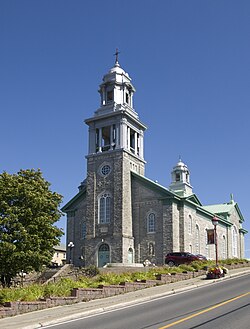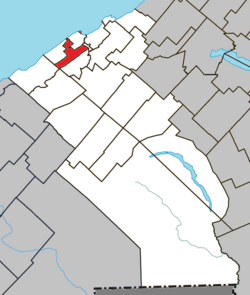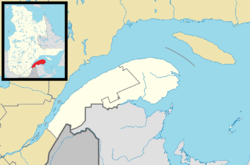Mont-Joli (French: [mɔ̃ ʒɔli]) is a city in the La Mitis Regional County Municipality within the Bas-Saint-Laurent region of Quebec, Canada. It is the county seat. The city is located east of Rimouski near the south shore of the Saint Lawrence River.
Mont-Joli | |
|---|---|
 Notre-Dame-de-Lourdes de Mont-Joli Church | |
 Location within La Mitis RCM | |
| Coordinates: 48°35′N 68°11′W / 48.58°N 68.18°W[1] | |
| Country | |
| Province | |
| Region | Bas-Saint-Laurent |
| RCM | La Mitis |
| Constituted | 13 June 2001 |
| Government | |
| • Mayor | Martin Soucy |
| • Federal riding | Avignon—La Mitis—Matane—Matapédia |
| • Prov. riding | Matane-Matapédia |
| Area | |
• Total | 24.30 km2 (9.38 sq mi) |
| • Land | 24.24 km2 (9.36 sq mi) |
| Elevation | 75 m (246 ft) |
| Population | |
• Total | 6,384 |
| • Density | 263.3/km2 (682/sq mi) |
| • Pop 2016–2021 | |
| • Dwellings | 3,173 |
| Time zone | UTC−5 (EST) |
| • Summer (DST) | UTC−4 (EDT) |
| Postal code(s) | |
| Area code(s) | 418 and 581 |
| Highways | |
| Website | www |
History
editIn 1867, the main condition for New Brunswick and Nova-Scotia entering into the Canadian Confederation was, to be linked to the rest of the country by the railway. In 1868, work began on the Intercolonial Railway and the authorities decided to have the railway turn at Saint-Octave-de-Métis in Gaspésie. However, this village, because of its rugged landscape, was not suitable to receive the train station and maintenance shops. The engineers turned to the higher 2nd farming rank of Sainte-Flavie, and the train station was named Sainte-Flavie-Station. In 1880, Sainte-Flavie-Station became separate and was named Mont-Joli, the name which the first settlers had used to describe the area.
On 13 June 2001, the neighbouring municipality of Saint-Jean-Baptiste (not to be confused with a different Saint-Jean-Baptiste in the Montérégie region) merged with Mont-Joli.[4]
Geography
editClimate
editMont-Joli has a humid continental climate (Köppen Dfb). The average annual temperature in Mont-Joli is 3.9 °C (39.0 °F). The average annual precipitation is 931.7 mm (36.68 in) with October as the wettest month. The temperatures are highest on average in July, at around 17.9 °C (64.2 °F), and lowest in January, at around −11.3 °C (11.7 °F). The highest temperature ever recorded in Mont-Joli was 35.9 °C (96.6 °F) on 4 July 1983; the coldest temperature ever recorded was −34.7 °C (−30.5 °F) on 3 January 2014.
| Climate data for Mont-Joli Climate ID: 7055121; coordinates 48°36′32″N 68°12′27″W / 48.60889°N 68.20750°W; elevation: 52.4 m (172 ft); WMO ID: 71718; 1991–2020 normals, extremes 1943–present | |||||||||||||
|---|---|---|---|---|---|---|---|---|---|---|---|---|---|
| Month | Jan | Feb | Mar | Apr | May | Jun | Jul | Aug | Sep | Oct | Nov | Dec | Year |
| Record high humidex | 13.7 | 11.3 | 25.7 | 30.5 | 37.8 | 42.7 | 41.6 | 41.3 | 39.3 | 31.0 | 25.2 | 18.7 | 42.7 |
| Record high °C (°F) | 13.3 (55.9) |
12.4 (54.3) |
23.3 (73.9) |
29.1 (84.4) |
33.7 (92.7) |
35.1 (95.2) |
35.9 (96.6) |
35.1 (95.2) |
32.6 (90.7) |
26.7 (80.1) |
23.3 (73.9) |
16.7 (62.1) |
35.9 (96.6) |
| Mean daily maximum °C (°F) | −7.2 (19.0) |
−6.2 (20.8) |
−0.9 (30.4) |
6.0 (42.8) |
14.0 (57.2) |
19.8 (67.6) |
22.9 (73.2) |
22.1 (71.8) |
17.3 (63.1) |
9.7 (49.5) |
3.5 (38.3) |
−2.9 (26.8) |
8.2 (46.8) |
| Daily mean °C (°F) | −11.3 (11.7) |
−10.3 (13.5) |
−4.9 (23.2) |
2.0 (35.6) |
9.0 (48.2) |
14.6 (58.3) |
17.9 (64.2) |
17.1 (62.8) |
12.7 (54.9) |
6.1 (43.0) |
0.4 (32.7) |
−6.2 (20.8) |
3.9 (39.0) |
| Mean daily minimum °C (°F) | −15.4 (4.3) |
−14.4 (6.1) |
−8.9 (16.0) |
−1.9 (28.6) |
3.9 (39.0) |
9.2 (48.6) |
12.9 (55.2) |
12.1 (53.8) |
8.0 (46.4) |
2.5 (36.5) |
−2.8 (27.0) |
−9.6 (14.7) |
−0.4 (31.3) |
| Record low °C (°F) | −34.7 (−30.5) |
−31.1 (−24.0) |
−29.4 (−20.9) |
−19.9 (−3.8) |
−12.2 (10.0) |
−1.1 (30.0) |
0.8 (33.4) |
1.8 (35.2) |
−5.0 (23.0) |
−8.4 (16.9) |
−18.3 (−0.9) |
−30.6 (−23.1) |
−34.7 (−30.5) |
| Record low wind chill | −51.3 | −48.3 | −39.4 | −29.0 | −17.8 | −3.3 | 0.0 | 0.0 | −6.7 | −13.1 | −29.6 | −43.5 | −51.3 |
| Average precipitation mm (inches) | 74.0 (2.91) |
65.0 (2.56) |
70.0 (2.76) |
64.0 (2.52) |
75.5 (2.97) |
76.1 (3.00) |
92.5 (3.64) |
77.5 (3.05) |
85.7 (3.37) |
97.0 (3.82) |
73.7 (2.90) |
80.6 (3.17) |
931.7 (36.68) |
| Average rainfall mm (inches) | 10.4 (0.41) |
4.6 (0.18) |
13.4 (0.53) |
42.3 (1.67) |
73.7 (2.90) |
76.1 (3.00) |
92.5 (3.64) |
77.5 (3.05) |
85.7 (3.37) |
88.1 (3.47) |
44.2 (1.74) |
21.4 (0.84) |
630.0 (24.80) |
| Average snowfall cm (inches) | 71.6 (28.2) |
66.2 (26.1) |
60.3 (23.7) |
21.8 (8.6) |
1.8 (0.7) |
0.0 (0.0) |
0.0 (0.0) |
0.0 (0.0) |
0.0 (0.0) |
3.9 (1.5) |
30.6 (12.0) |
66.8 (26.3) |
323.0 (127.2) |
| Average precipitation days (≥ 0.2 mm) | 20.7 | 16.5 | 14.3 | 12.4 | 13.5 | 13.0 | 14.0 | 13.0 | 12.3 | 14.9 | 14.9 | 18.4 | 178.0 |
| Average rainy days (≥ 0.2 mm) | 2.5 | 1.5 | 4.0 | 9.1 | 13.4 | 13.0 | 14.0 | 13.0 | 12.3 | 14.1 | 8.9 | 3.9 | 109.6 |
| Average snowy days (≥ 0.2 cm) | 19.9 | 15.9 | 12.0 | 5.6 | 0.48 | 0.0 | 0.0 | 0.0 | 0.0 | 1.3 | 8.4 | 16.9 | 80.4 |
| Average relative humidity (%) (at 1500 LST) | 71.8 | 70.1 | 68.2 | 64.0 | 59.3 | 61.2 | 64.3 | 63.6 | 65.6 | 70.6 | 72.9 | 74.8 | 67.2 |
| Source: Environment Canada[5] | |||||||||||||
Demographics
edit| Year | Pop. | ±% |
|---|---|---|
| 1881 | 710 | — |
| 1891 | 742 | +4.5% |
| 1901 | 822 | +10.8% |
| 1911 | 2,141 | +160.5% |
| 1921 | 2,799 | +30.7% |
| 1931 | 3,143 | +12.3% |
| 1941 | 3,533 | +12.4% |
| 1951 | 4,938 | +39.8% |
| 1956 | 6,179 | +25.1% |
| 1961 | 6,178 | −0.0% |
| 1966 | 6,366 | +3.0% |
| 1971 | 6,698 | +5.2% |
| 1976 | 6,508 | −2.8% |
| 1981 | 6,713 | +3.1% |
| 1986 | 6,670 | −0.6% |
| 1991 | 6,265 | −6.1% |
| 1996 | 6,267 | +0.0% |
| 2001 | 5,886 | −6.1% |
| 2006 | 6,568 | +11.6% |
| 2011 | 6,665 | +1.5% |
| 2016 | 6,281 | −5.8% |
| 2021 | 6,384 | +1.6% |
In the 2021 Census of Population conducted by Statistics Canada, Mont-Joli had a population of 6,384 living in 3,034 of its 3,173 total private dwellings, an increase of 1.6% from its 2016 population of 6,281. With a land area of 24.24 km2 (9.36 sq mi), it had a population density of 263.4/km2 (682.1/sq mi) in 2021.[7]
| 2021 | 2016 | 2011 | |
|---|---|---|---|
| Population | 6,384 (+1.6% from 2016) | 6,281 (-5.8% from 2011) | 6,665 (+1.5% from 2006) |
| Land area | 24.24 km2 (9.36 sq mi) | 24.20 km2 (9.34 sq mi) | 24.25 km2 (9.36 sq mi) |
| Population density | 263.3/km2 (682/sq mi) | 259.5/km2 (672/sq mi) | 272.6/km2 (706/sq mi) |
| Median age | 52.8 (M: 50.4, F: 55.6) | 51.3 (M: 49.9, F: 52.7) | 49.8 (M: 48.0, F: 50.8) |
| Private dwellings | 3,173 (total) | 3,102 (total) | 3,138 (total) |
| Median household income | $51,600 | $43,568 | $46,221 |
| Canada Census Mother Tongue - Mont-Joli, Quebec[6] | ||||||||||||||||||
|---|---|---|---|---|---|---|---|---|---|---|---|---|---|---|---|---|---|---|
| Census | Total | French
|
English
|
French & English
|
Other
| |||||||||||||
| Year | Responses | Count | Trend | Pop % | Count | Trend | Pop % | Count | Trend | Pop % | Count | Trend | Pop % | |||||
2021
|
6,095
|
6,005 | 0.3% | 98.5% | 40 | 33.3% | 0.7% | 20 | 0.0% | 0.3% | 20 | 33.3% | 0.3% | |||||
2016
|
6,085
|
6,025 | 4.2% | 99.0% | 30 | 25.0% | 0.5% | 20 | 33.3% | 0.3% | 15 | 25.0% | 0.2% | |||||
2011
|
6,385
|
6,290 | 2.2% | 98.5% | 40 | 11.1% | 0.6% | 30 | 0.0% | 0.5% | 20 | 50.0% | 0.3% | |||||
2006
|
6,265
|
6,155 | 12.5% | 98.2% | 45 | 80.0% | 0.7% | 30 | n/a% | 0.5% | 40 | n/a% | 0.6% | |||||
2001
|
5,510
|
5,470 | n/a | 99.3% | 25 | n/a | 0.5% | 0 | n/a | 0.0% | 0 | n/a | 0.0% | |||||
Infrastructure
editMont-Joli is the easternmost end of Autoroute 20, whose segment connects with the city of Rimouski. Route 132 runs through the centre of Mont-Joli as part of a loop that circumnavigates the Gaspé Peninsula; it is about 3 km (2 mi) southeast of Sainte-Flavie, where Route 132 intersects with itself.
Mont-Joli Airport is the only airport with scheduled service in the Bas-Saint-Laurent region. Mont-Joli is also served by the Mont-Joli railway station.
Notable people
edit- Gaétan D'Amours: Mr. Québec 1960, Mr. Canada 1961, Mr. America 1961, Mr. Universe 1967 (5th place)
- Danielle Doyer: politician
- Donald Dufresne: ex-NHL hockey player and assistant manager to the Rimouski Océanic
- René Dupéré: composer for Cirque du Soleil
- Pierre Labrie: writer
- Maurice Lamontagne: economist and Canadian Senator
- Robert Piché: airline pilot in Mont-Joli, involved in the 236 Air Transat incident
- Gervais Rioux: Olympic cyclist (Seoul, 1988)
See also
editReferences
edit- ^ "Banque de noms de lieux du Québec: Reference number 79930". toponymie.gouv.qc.ca (in French). Commission de toponymie du Québec.
- ^ a b "Répertoire des municipalités: Geographic code 09077". www.mamh.gouv.qc.ca (in French). Ministère des Affaires municipales et de l'Habitation.
- ^ a b "Census Profile, 2021 Census, Statistics Canada - Validation Error".
- ^ "Fiche descriptive".
- ^ "Mont-Joli Quebec". Canadian Climate Normals 1991–2020. Environment and Climate Change Canada. 5 July 2024. Archived from the original on 5 July 2024. Retrieved 5 July 2024.
- ^ a b Statistics Canada: 1996, 2001, 2006, 2011, 2016, 2021 census
- ^ "Population and dwelling counts: Canada, provinces and territories, and census subdivisions (municipalities), Quebec". Statistics Canada. 9 February 2022. Retrieved 29 August 2022.
- ^ "2021 Community Profiles". 2021 Canadian census. Statistics Canada. 4 February 2022. Retrieved 22 November 2024.
- ^ "2016 Community Profiles". 2016 Canadian census. Statistics Canada. 12 August 2021. Retrieved 22 November 2024.
- ^ "2011 Community Profiles". 2011 Canadian census. Statistics Canada. 21 March 2019. Retrieved 22 November 2024.


